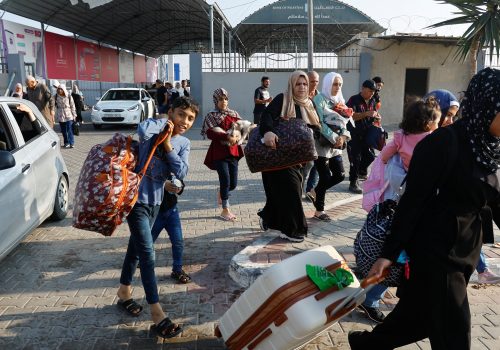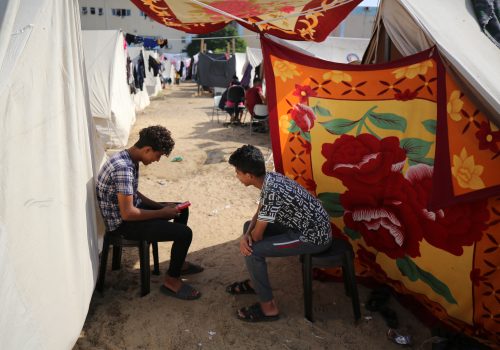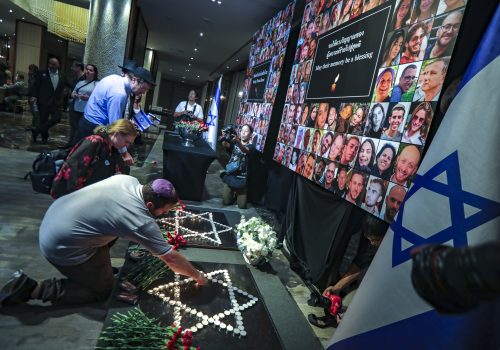Why Israel has no imminent plans to wind down its war on Hamas
After almost two months of combat between Israel and Hamas, the first release of Israeli hostages—at a lopsided ratio of three Palestinian prisoners for every single Israeli hostage—is finally underway, with the initial tranche delivered on November 24. Further deals may be in the pipeline. The hostage issue remains a huge priority for Israel’s government, which not only failed dismally to protect its civilian population from the brutal October 7 attack but also maintains a historic commitment to repatriating its missing soldiers.
Israel has a long and fraught history of negotiating the return of Israelis in captivity. The unsuccessful lengths to which the country has gone to retrieve Israeli Air Force navigator Ron Arad, who disappeared after ejecting over Lebanon back in 1986, are legendary. In 2011, Israel also authorized the release of a staggering 1,027 prisoners—280 of whom were serving life sentences for their involvement in the perpetration of deadly terror attacks—to secure the freedom of Gilad Shalit, an enlisted member of the Israel Defense Forces (IDF) who was abducted to Gaza from southern Israel. The fact that Yahya Sinwar, the Hamas chief who spearheaded the October 7 massacre, was among the cohort swapped for Shalit only underscores an inherent hazard of the current process.
Lack of faith in Hamas’s intentions to complete the exchange notwithstanding—the organization has resorted repeatedly to psychological warfare devices in exploiting Israel’s collective sensitivity to hostage-taking—ministers of Prime Minister Benjamin Netanyahu’s cabinet voted overwhelmingly to approve the bargain. The component that has emerged, however, as the greatest source of concern from Israel’s perspective is the stipulated pause in fighting, which will accompany the release of the captives: a four-day suspension, with the possibility of extension, should Hamas produce the return of additional hostages.
The precise framing of this topic by Israeli principals highlights their emphatic resistance to instituting a more permanent cessation of hostilities. Despite calls from some quarters of the global community for an actual ceasefire in Gaza and amid prevalent aspirations that the agreed-upon pause could generate momentum toward that outcome, Israel remains adamant in its resolve to continue the IDF ground offensive once the present arrangement expires. That position is putting Jerusalem at loggerheads with even some of its ostensible friends whose support for the effort to dismantle Hamas has become more equivocal as conditions in Gaza have worsened.
The rude awakening of October 7 sent Israeli decision-makers back to the drawing board, their previous strategy in tatters. Any hope that years of a tenuous equilibrium—where Hamas, a US-designated terrorist group, was sustained to administer the Gaza Strip—would generate robust security for Israel was shattered when 1,200 Israelis were murdered that Sabbath morning. Nobody, Hamas included, could claim credibly to be surprised by the IDF’s response to the atrocities of that day. “What was in Gaza, will no longer be,” Defense Minister Yoav Gallant said on October 10, telegraphing Israel’s intentions.
Operation Swords of Iron, initiated to “defend Israeli civilians against the combined attack launched against Israel by Hamas,” morphed quickly into a full-fledged war with the broader objectives, as articulated by Prime Minister Netanyahu, “to eliminate Hamas by destroying its military and governing abilities, and to do everything possible to bring our captives home.” The rhetoric employed by Israeli officials since the elucidation of those goals has offered no indication of any imminent course change.
Israeli spokesmen have vehemently eschewed any formal language of “ceasefire,” insisting instead that Israel would consent, at most, to only temporary breaks in pursuing the IDF’s mission to remove Hamas from power in Gaza. By their rationale, bringing the war to an immediate close would be premature. It would ensconce Hamas firmly in charge, still retaining numerous Israeli hostages and poised to commence rapid reconstruction of its infrastructure. Hamas could then leverage the introduction of international aid to devote resources to restoring its military capabilities and underground tunnel network, which—as Hamas leaders have pledged vociferously—would be turned again soon on Israel. Compounding their distrust of declared ceasefires with Hamas, Israelis remember exactly how Hamas disrespected such a declaration in 2014 when it abducted IDF Lieutenant Hadar Goldin hours after a ceasefire had come into effect. (Hamas still refuses to return Goldin, who was later pronounced dead, for burial in Israel.)
The policy establishment in Israel is apprehensive similarly about what or who would fill the vacuum in Gaza if and when the IDF should depart the area. The West Bank-based Palestinian Authority, often touted as the natural candidate for this role, is in severe disarray and uninspiring confidence in its abilities to assert dominion over the Gaza Strip, from which it was expelled forcibly by Hamas in 2007. Israel’s experience with multinational teams—supposing that countries can be found to volunteer for that task—raises cause for distress that foreign contingents would be similarly ineffective. Meanwhile, a ceasefire would impose constraints on Israeli measures against Hamas, heightening the vulnerability of Israel to renewed acts of terrorism.
There is no desire in Israel to play into Hamas’s hands by granting them the enduring ceasefire that they crave. Such a truce—as was in place effectively until Hamas decided to violate its terms unilaterally on October 7—would relieve pressure on the embattled organization and allow its forces to regroup. In this context, the preference of Hamas for dragging out the upcoming hostage release over four days—while also dangling the potential for subsequent exchanges—is perceived by Israel as extortion designed to complicate the resumption of full IDF operations in Gaza.
All told, the reality of a ceasefire, by Israel’s logic, would be critically unstable. It would be detrimental to Israeli deterrence and be destined inevitably to degrade into an even more lethal round of hostilities that could expand like wildfire to other neighboring theaters.
More in line with Israeli thinking is what Joe Biden administration officials have called “tactical humanitarian pauses” for the limited purposes of enabling non-combatants to exit battle zones, increasing the flow of aid provisions, and facilitating the release of hostages. (According to Netanyahu, it has been only through the application of “relentless military pressure” and supplementary “diplomatic pressure” that the latest releases were achieved.) In these circumstances, the IDF would stay deployed in forward field locations, from where it would continue to collect vital intelligence, expose and destroy Hamas arsenals, command posts, and launch sites, and stand by to quickly remobilize positioned assets for the next phase of its war on Hamas.
Motivation in Israel, where the trauma of October 7 is still palpable, remains high to persist until the eradication of Hamas and its capability to inflict harm on Israeli targets. Defense Minister Yoav Gallant has inferred openly that IDF troops will soon be operating in the southern Gaza Strip as well.
Although the White House has pushed back vigorously against critics and not wavered in its public support for Israel’s war aims—”as long as Hamas clings to its ideology of destruction, a cease-fire is not peace,” President Biden wrote in the Washington Post on November 18—prevailing uncertainties about Israel’s endgame are threatening to gnaw away at the legitimacy of a protracted campaign in Gaza. Israeli policymakers will certainly look to lock down as many tangible gains as possible before time might, eventually, run out.
Shalom Lipner is a nonresident senior fellow for Middle East Programs at the Atlantic Council. From 1990 to 2016, he served seven consecutive premiers at the Prime Minister’s Office in Jerusalem. Follow him on X: @ShalomLipner.
Further reading
Fri, Nov 3, 2023
As the Gaza war continues, Egypt is facing pressure to act
MENASource By Shahira Amin
As Israel expands its ground raids in the Gaza Strip, Egypt is witnessing the ripple effects of the war and faces growing pressure to act in regard to Palestinian refugees.
Fri, Oct 27, 2023
A humanitarian corridor in the Israeli Negev could save Gazans
MENASource By
There is no perfect solution to alleviate the death and destruction that awaits in the Gaza Strip, but getting women, children, and the elderly out of harm’s way would be a positive step.
Wed, Oct 25, 2023
The kidnapping of a peace activist by Hamas reveals the cruel irony of the situation Israel faces
MENASource By Carmiel Arbit
The hostage crisis Israel is facing is unprecedented. Yet, there is some familiarity with the territory.
Image: A woman walks past an installation with pictures of hostages taken by Palestinian Islamist group Hamas, amid the temporary truce between Hamas and Israel, in Tel Aviv, Israel November 27, 2023. REUTERS/Athit Perawongmetha


